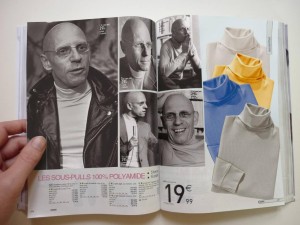Rod Macdonald was a brilliant mind, a warm, often generous mentor, and a charming man. One of the things he taught me is that, when you are smart, well-educated, charming in your own way—and, I suppose, if we are to be honest with our typology, when you are a man—avoiding hagiography, and by the same lights, preventing admiration from turning into discipleship, required finding ways to keep people at a distance, ways to compensate for the charm.
It seems to me that Foucault’s strategy was the same as Rod’s: if you want to ensure that the enfant terrible is not appointed under protest as leader of a movement, one can simply be childish. If you want people to take you seriously, but not too seriously, act like a brat. Viz (translation in hover text):
Je voudrais que mes livres soient une sorte de tool-box dans lequel les autres puissent aller fouiller pour y trouver un outil avec lequel ils pourraient faire ce que bon leur semble, dans leur domaine. L’ Histoire de la folie, je l’ai écrite un peu à l’aveuglette, dans une sorte de lyrisme dû à des expériences personnelles. Je suis attaché à ce livre, bien sûr, parce que je l’ai écrit, mais aussi parce qu’il a servi de tool-box à des personnes différentes les unes des autres, comme les psychiatres de l’antipsychiatrie britannique, comme Szasz aux États-Unis, comme les sociologues en France : ils l’ont fouillé, ont trouvé un chapitre, une forme d’analyse, quelque chose qui leur a servi ultérieurement.
Les Mots et les Choses, au fond, est un livre qui est beaucoup lu, mais peu compris. Il s’adressait aux historiens des sciences et aux scientifiques, c’était un livre pour deux mille personnes. Il a été lu par beaucoup plus de gens, tant pis. Mais, à certains scientifiques, comme Jacob, le biologiste prix Nobel, il a servi. Jacob a écrit La Logique du vivant; il y avait des chapitres sur l ‘histoire de la biologie, sur le fonctionnement du discours biologique, sur la pratique biologique, et il m’a dit qu’il s’est servi de mon livre. Le petit volume que je voudrais écrire sur les systèmes disciplinaires, j’aimerais qu’il puisse servir à un éducateur, à un gardien, à un magistrat, à un objecteur de conscience. Je n’écris pas pour un public, j’écris pour des utilisateurs, non pas pour des lecteurs.
This short quotation, of course, provides a delicious example of his strategy (“Il a été lu par beaucoup plus de gens, tant pis”–what an asshole! what a brat!), while demonstrating, if one takes its key thrust about how he hoped his work on discipline and governance might be put to use and holds it up to the light of most the literature that subsequently drew on his work, just how unsuccessful that strategy was.
